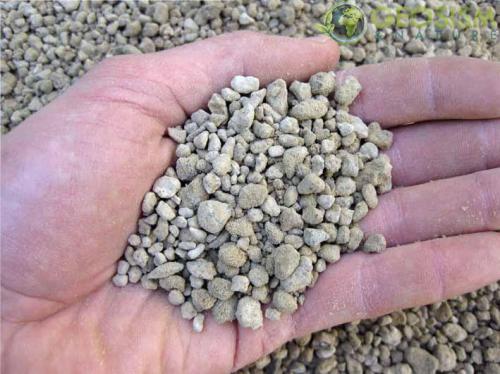Zeolite & pumice 0/3 mm (1 kg - approximately 1.2 lt)
ZEOLITE & PUMICE 0/3 mm (1 Kg - approximately 1.2 lt) .
It is a natural volcanic mineral with a high and selective cation exchange power.
Total zeolite content: approximately 58% (Chabasite 45÷53%; Phillipsite 3÷6%; Analcime 3÷5%).
The material has a small quantity of processing dust useful for the growth and nourishment of plants. The product is a natural mix of the two minerals (it is not an artificial mixture of pumice and zeolite); it is, therefore, a rock that has a composition that is halfway between pumice and zeolite.
Group of minerals made up of 52 mineralogical species chemically defined as "hydrated aluminosilicates of alkaline and/or alkaline earth elements" (essentially, Na, K and Ca) and structurally constituting the tectosilicate family with feldspars, feldspathoids and silica minerals. In this family of silicates, the primary structural units, tetrahedra [(Si, Al) O 4 ], are connected to each other in the three directions of space to form three-dimensional scaffolds resulting in a ratio between tetrahedral cation (Si, Al) and oxygen of 1 :2.
Unlike what occurs in other families of silicates where the same structural units are isolated (nesosilicates, e.g. olivines), connected in a single direction (inosilicates, e.g. pyroxenes) or in two directions (phyllosilicates, e.g. clay minerals ), the three-dimensional tetrahedral framework of tectosilicates gives rise to "open" structures due to the presence of extratretrahedral cavities of increasing volume from feldspars and silica minerals to feldspathoids to zeolites.
The three-dimensional tetrahedral framework of zeolites is "very open" (low tetrahedral density) and, as such, has large internal cavities (from 20 to 50% of the volume of the crystal) communicating with each other and with the outside through molecular-sized channels (from 2.5 to about 7 Å; 1 Å = 10 ?8 cm).
In the natural state, cavities and channels are occupied by cations (Na, K, Ca) and water molecules. The cations, necessary to balance the negative electrical charges of the tetrahedral scaffold due to the partial replacement of Si 4 + with Al 3 +, being weakly bound to the tetrahedral scaffold, enjoy a certain freedom of movement and can exit, through the channels, from the cavities and therefore from the crystal only if replaced by other cations carrying the same number of positive electric charges.
This property, known as "cation exchange capacity" (CSC), has an intensity (expressed in meq/g) increasing with increasing Al content in the tetrahedra and varies from around 2 meq/g in Al-poor zeolites (clinoptilolite , ferrierite tenerite) at 3-4 meq/g in Al-rich zeolites (chabasite, phillipsite).
The water, from 10 to 20% by weight depending on the zeolitic species, can be easily and more or less continuously removed by heating below 300-350 °C with no or modest modifications of the tetrahedral scaffold.
The zeolites dehydrated in this way have a large internal surface (up to a few hundred m2 per gram of substance) available to host water molecules or other molecules with natural or induced polarity. The dehydration-rehydration process is almost infinitely reversible and the absorption of polar molecules occurs according to a rigid "selection" based "primarily" on the size of the molecules and, secondarily, on their degree of polarity.
PHYSICO -CHEMICAL CHARACTERISTICS
BULK DENSITY: 80 0 - 1000 Kg/m3 (quarry humidity) ;
CSC: 170-200 meq/100 gr;
REVERSIBLE DEHYDRATION ;
HIGH STRUCTURAL CRYPTOPOROSITY ;
pH: 7 - 8;
WATER RETENTION ;
MECHANICAL RESISTANCE ;
PERMEABILITY ;
LOW DENSITY ;
NON-TOXIC PRODUCT: (free from crystalline free silica).
MEDIA CHEMICAL ANALYSIS
SiO 2 : 49-51%;
Al 2 O 3 : 12-15%;
K 2 O: 5.5-6.5%;
Fe 2 O 3 : 3.5-4.5%;
CaO: 2.8-3.5%;
Na 2 O: 0.5-0.7%;
TiO 2 : 0.3-0.6%;
MgO: 1-2%;
MnO: 0.1-0.3%;
P 2 O 5 : 0.1-0.3%.
IDEAL FOR
? The neutralization of harmful elements, ammonium, heavy metals and organic molecules;
? The absorption of odorous gases, ammonia, hydrogen sulphide, mercaptans;
? Improve the exploitation of fertilizers by reducing the quantity to be used;
? The range of dried products is used as an absorbent and filter for industrial oils, cleaning of surfaces in general, light abrasive and component of premixed products for the construction industry;
? To be used in addition to growing media or as a soil improver;
? Lightweight aggregate for mortars and cement conglomerates.
FUNCTIONAL CHARACTERISTICS
Natural volcanic material whose technological properties are the basis of its consolidated and advantageous use in:
? WASTE WATER PURIFICATION - PHYTO-PURIFICATION: the concentration in NH4 of the wastewater deriving from biological activities from the disposal of municipal solid waste, from industrial activities and the content of polluting elements of industrial wastewater are drastically reduced through dynamic or static treatments with zeolites with appropriate selectivity for the polluting ion.
? AGRICULTURE: the insertion of zeolites in agricultural land and in substrates used for horticultural crops in
greenhouse involves a clear qualitative and quantitative improvement in production, a reduction in the use of
synthetic fertilizers, water for irrigation and pollution of the surface hydrological system e
deep.
N B: NEWS ON PACKAGING
Please note that the product will arrive in a bag (with a total weight of 1 kg, as specified in the title of the advertisement) labeled and packaged, according to the terms of the law, by the employees of Geosism & Nature sas












